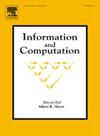Identity based proxy blind signature scheme using NTRU lattices
IF 1
4区 计算机科学
Q3 COMPUTER SCIENCE, THEORY & METHODS
引用次数: 0
Abstract
Proxy blind signatures represent a specific type of blind signature that allows a proxy signer to sign documents on behalf of the original signer without having access to the content they are signing. Currently, most of the existing proxy blind signature schemes rely on complex number-theoretic hard problems like bilinear pairing and the discrete logarithm problem or on general lattices' hardness. Unfortunately, the security of number-theoretic hard problems-based systems is struggling due to vulnerability to Shor's algorithm, which jeopardizes the security of cryptographic schemes based on them, and general lattices suffer from large key sizes. Thus, we are looking for a new scheme that is efficient in time and storage, has short key and signature sizes, and is crucially secure against threats posed by quantum computers. Recently, NTRU lattice-based schemes have gained significant popularity due to their ease of implementation and proven security reductions. In 2018, Zhu et al. presented an identity-based proxy blind signature scheme over NTRU lattices, which is not secure. Therefore, by explaining the security breach of Zhu et al.'s scheme, we present a novel, secure, and improved identity-based proxy blind signature system resistant to quantum threats and utilizing NTRU lattices. Based on the standard hardness assumptions related to the approximate shortest vector problem (γ-SVP) and the shortest integer solution problem (SIS), it is demonstrated that the proposed method is secure against quantum forgery.
基于身份的NTRU格代理盲签名方案
代理盲签名是一种特定类型的盲签名,它允许代理签名者代表原始签名者签署文档,而无需访问他们正在签署的内容。目前已有的代理盲签名方案大多依赖于双线性配对、离散对数等复杂的数论难题或一般格的硬度。不幸的是,基于数论难题的系统由于容易受到Shor算法的攻击,使得基于它们的加密方案的安全性受到威胁,并且一般的格受到大密钥大小的影响。因此,我们正在寻找一种新的方案,它在时间和存储上都是有效的,具有短密钥和签名大小,并且对量子计算机构成的威胁至关重要。最近,NTRU基于格子的方案因其易于实现和经过验证的安全性降低而获得了极大的普及。2018年,Zhu等人在NTRU格上提出了一种基于身份的代理盲签名方案,该方案不安全。因此,通过解释Zhu等人方案的安全漏洞,我们提出了一种新的、安全的、改进的基于身份的代理盲签名系统,该系统利用NTRU格抵抗量子威胁。基于与近似最短向量问题(γ-SVP)和最短整数解问题(SIS)相关的标准硬度假设,证明了该方法具有抗量子伪造的安全性。
本文章由计算机程序翻译,如有差异,请以英文原文为准。
求助全文
约1分钟内获得全文
求助全文
来源期刊

Information and Computation
工程技术-计算机:理论方法
CiteScore
2.30
自引率
0.00%
发文量
119
审稿时长
140 days
期刊介绍:
Information and Computation welcomes original papers in all areas of theoretical computer science and computational applications of information theory. Survey articles of exceptional quality will also be considered. Particularly welcome are papers contributing new results in active theoretical areas such as
-Biological computation and computational biology-
Computational complexity-
Computer theorem-proving-
Concurrency and distributed process theory-
Cryptographic theory-
Data base theory-
Decision problems in logic-
Design and analysis of algorithms-
Discrete optimization and mathematical programming-
Inductive inference and learning theory-
Logic & constraint programming-
Program verification & model checking-
Probabilistic & Quantum computation-
Semantics of programming languages-
Symbolic computation, lambda calculus, and rewriting systems-
Types and typechecking
 求助内容:
求助内容: 应助结果提醒方式:
应助结果提醒方式:


